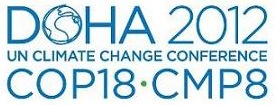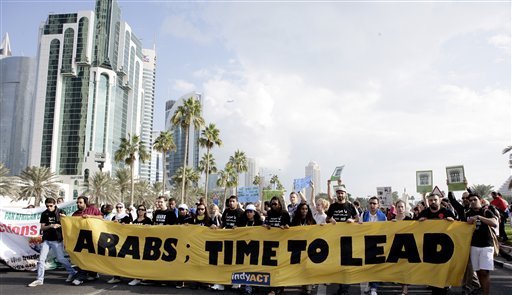Victory here is to change a word, [...]]]>

Qatar and Doha at night
You would never know I am an urgent, existential issue threatening human civilisation at the U.N. climate summit here in the final week in Doha. It is more like a trade negotiation, where hard-fought agreement to change the word “shall” to “may” in a document is considered progress.
Victory here is to change a word, not the world.
Three years ago, more than 100,000 people marched through the streets of Copenhagen during COP15 shouting “System Change, Not Climate Change!” There is not even a whisper of that call here at COP18.
Outside the security barriers, the Qatari capital of Doha, one of the world’s most energy-profligate cities, ignores what’s going on inside COP18. There was a march on Saturday, the first ever in the city, apparently. Three hundred mainly young people marched asking Arab nations to lead in taking action to reduce fossil fuel emissions.
Marchers were careful not to say “system change” in a country where a poet was jailed for life only two days before. He had written a poem deemed insulting to Qatar’s Emir, the ruler of this country built on gas and oil.
And yet “system change” is clearly what you need. Your global economy is based on fossil fuels that put more than 30 billion tonnes of carbon dioxide (CO2) into the atmosphere every year. It is this carbon pollution that makes me ever more powerful. And don’t forget your carbon footprint will be cooking the planet long after you are gone. What will your grandchildren and great-grandchildren think of the way you spent your life?

No one wants to leave this awful legacy. So why is there so little change? Coal, gas and oil companies represent the richest and most powerful industry ever. If they don’t want change, nothing will change. After 18 years of U.N. climate negotiations, humanity is still increasing CO2 emissions. In fact, emissions will reach yet another record high in 2012.
Nothing here at COP 18 will prevent 2013 from setting another record for CO2 emissions.
The U.N. climate negotiations may be the most complex and difficult ever attempted, but all that is being decided is who will do what, by when and who will pay. Everyone here knows the real problem is a “lack of political will”. Political will is not at COP 18, it resides in national capitals. And that’s where fossil fuel interests are most at home.
I am not a science problem, or a technical issue or even an economic challenge. My growing power is a failure of democracy. The interests of a few are trumping the welfare of the many – and the welfare of seven generations to come.
]]>
Viewed through the prism of a zero-sum conflict between a [...]]]>
]]>Viewed through the prism of a zero-sum conflict between a US-led alliance of Arab autocrats and Israel against an Iran-led “resistance” camp, the Arab rebellion has been nothing short of catastrophic for the anti-Iran forces. Not only has the Egyptian uprising swept away one of the key antagonists of Iran in the person of Hosni Mubarak; the fact that two Iranian warships were allowed to sail through the Suez Canal en route to Syria last week was a clear signal that the new military rulers in Cairo hope to normalise ties with the Islamic Republic, and are unlikely to support a regional strategy of confronting Tehran, much less take the lead in promoting one. Even before Egypt and Tunisia, the anti-Iran camp had suffered major setbacks in Lebanon and Iraq. Events in Bahrain, Jordan and elsewhere suggest that Arab leaders pressing hardest to confront Iran are in deep trouble.
[...]
But whatever its current state of progress, Iran’s nuclear development is simply not a priority for the newly empowered Arab public, and more accountable Arab governments are likely to distance themselves from Washington’s regional strategy, pretty much as Turkey has done. That’s precisely why so many US and Israeli observers paint the Arab rebellion as a win for Iran. But that conclusion is based on the flawed premise that a setback for the United States is automatically a gain for Iran. The Arab declaration of independence from Washington is anything but a declaration of loyalty to Tehran. Turkey may have built new trade and diplomatic ties with Tehran and opposed the US policy on Iran, but it has not broken ties with Washington. Its policies are genuinely independent, geared towards resolving problems rather than power bloc politics.
When the Bush administration used the Iraq War as a vehicle to spread democratic change in the Middle East, anger with the United States on foreign policy issues — particularly Iraq and the Arab-Israeli conflict [...]]]>
]]>When the Bush administration used the Iraq War as a vehicle to spread democratic change in the Middle East, anger with the United States on foreign policy issues — particularly Iraq and the Arab-Israeli conflict — and deep suspicion of U.S. intentions put the genuine democracy advocates in the region on the defensive. The outcome has been that, every year since the Iraq War began, polls of Arabs revealed their sense that the Middle East is even less democratic than before.
As we witness the remarkable and inspiring events in both Tunisia and Egypt, one has to wonder whether these events could have taken place even earlier had there not been the diversion of the Iraq War — and whether these upheavals might have swept away Saddam Hussein’s dictatorship without shots being fired from the outside.
Even in Iran, where there is obvious public opposition to the clerical regime, as indicated by the contestation over the 2009 presidential election, one wonders whether the Iranian people might succeed if the regime were robbed of its ability to point fingers at the West.